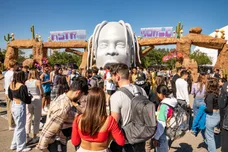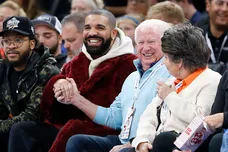In a recent interview with The New Yorker, Donald Glover offered his take on the success of his critically-acclaimed show Atlanta and dissected how television has changed over the years. Yet one part in particular stood out the most. While discussing Tay-K’s controversial hit single “The Race,” Glover had this to offer: “Look at this kid! He’s a baby! He never had a chance! Y’all are forgetting what rap is. Rap is ‘I don’t care what you think in society, wagging your finger at me for calling women “bitches”—when, for you to have two cars, I have to live in the projects.’” Calling it “a real Jesse James story,” Glover expanded on this thought process further. “Young black kid in Texas with a murder on him,” he said. “He’s definitely going to die, and it’s sad.”
As it turns out, the song appeared in the highly-rated season two premiere of Atlanta on March 1, kicking off Robbin Season with a bang. There’s no denying that “The Race” is a hit, with it’s melodic opening flute and simple, booming percussion over which Tay-K breaks down the door to deliver the catchy chorus: “Fuck a beat, I was tryna beat a case/But I ain’t beat that case, bitch I did the race.” The song draws its name from the fact that Tay-K recorded it while on the run from the law, and it quickly blew up in the summer of 2017 following his arrest. The music video for the song now sits at 120 million views on YouTube, and the hashtag #FreeTayK has been making its rounds on the internet for quite some time.
Yet if you do a little digging into the story of Tay-K, what you will find is rather troublesome. Last March, the viral rapper from Arlington, Texas cut off his ankle monitor and fled, disappearing for three months before finally being apprehended by U.S. Marshalls in New Jersey on June 30. He had been under house arrest due to his involvement in the home invasion and fatal shooting of 21-year-old Ethan Walker in Mansfield, Texas. It is believed he fled the state because prosecutors were seeking to try him as an adult, which would make him eligible for the death penalty. Tay-K is also a suspect in the fatal shooting of a 23-year-old man at a Chick-fil-A in San Antonio, Texas, and the attack and robbery of a 65-year-old man at a park in Arlington, Texas. The now incarcerated rapper will stand trial as an adult in Walker’s case, and only time will tell his fate. Things are looking grim given the fact that one of his accomplices in the robbery and murder of Walker was found guilty and sentenced to 20 years in prison on February 23.
However, Tay-K certainly isn’t the first rapper to have a history of violence and run-ins with the law. In fact, many of the most recognizable names in hip hop have storied and dark legal histories. For example, Tupac Shakur, who is an undeniable cultural icon, was charged with sexually assaulting a woman in a hotel room in November 1993. Although Shakur denied the charges, he was later convicted in 1994 of first-degree sexual abuse. He ended up serving four months in prison, during which he released his multi-platinum classic album Me Against The World, becoming the first artist to have a number one album on the Billboard 200 while serving a prison sentence. Snoop Dogg is another rapper who almost faced a lengthy period of time behind bars. In August 1993, Snoop and his bodyguard McKinley Lee were charged with first and second-degree murder for the death of Philip Woldemariam. Although they were both acquitted, Snoop continued to deal with ongoing legal issues stemming from the incident. Still, the high profile nature of the case undoubtedly boosted the sales of his debut album Doggystyle, which went on to sell over eleven million copies worldwide and was supported by the popular single “Murder Was The Case.” Ultimately, the individual careers of Tupac and Snoop weren’t negatively affected by their respective criminal histories; rather, such controversies added to their unique legacies.
As for Tay-K, his spate of violent crimes have made him famous, but for all the wrong reasons. His enormous rise in popularity and the outpouring of support he has received point to glaring issues, particularly when it comes to the ways that we as consumers choose to support artists who are inherently problematic. Now, more than ever, it is easier to consume music on a large scale, what with the advent of streaming and YouTube. Given how easy it is to access the internet, it is just as easy to forget that when we stream a song or watch a music video, we are making a choice to actively support the artist whose music we are consuming.
It’s a disturbing reality: hip hop audiences have long turned a blind eye to the troubling pasts of many rappers. Fans, members of the community, and even other artists continue to have difficulty holding those who are violent and unlawful accountable for their actions. This raises the question: how are we supposed to deal with the conundrum that arises when a talented artist whose work we admire commits heinous acts of violence? Where do we draw the line between the artist and the individual, particularly if songs are getting a lot of air time and we feel the need to acknowledge them, while at the same time recognizing that we don't want to give more attention to someone who has been violent and unlawful? Popular contemporary artists like XXXTentacion and Tekashi 6ix9ine have blurred the line even further with their work and with the support of their almost cult-like fan bases. The ever controversial X has a long and tumultuous legal history, punctuated by a series of deeply upsetting acts of violence. He is currently on house arrest and awaiting trial for a 2016 domestic-abuse case; he also faces charges of aggravated battery of a pregnant woman, domestic battery by strangulation, false imprisonment, and witness tampering. 6ix9ine, the braggadocious Brooklyn-bred rapper with rainbow colored hair and grill to match, pled guilty to one felony count of Use of a Child in a Sexual Performance in October 2015. To make matters even worse, in an interview with DJ Akademiks, 6ix9ine admitted to uploading a video of the act and stated “I was doing it for my image.”
Yet none of this has dissuaded fans from continuing to support Tay-K, X, and 6ix9ine’s music. Tay-K officially signed a record deal with 88 Classic back in December, and his hit single "The Race" was certified platinum. X continues to put out songs that attract millions of plays across all platforms, and his most recent hit record “SAD!” has close to 20 million views on YouTube and debuted at the number 17 spot on the Billboard Hot 100 Chart last week. Kylie Jenner, who remains one of the most followed people across the internet, was recently spotted playing “SAD!” on her Snapchat, an act that likely boosted the record even further. As for 6ix9ine, his premiere commercial mixtape Day69 debuted at the number four spot on the Billboard 200 with 55,000 album-equivalent units, and there are currently three charting songs from the project: “Gummo” at number 28; “Billy” at number 53; and “Keke” featuring Fetty Wap & A Boogie Wit da Hoodie at number 90. What these numbers reveal is that not only are fans choosing to remain willfully ignorant to the past history of such artists, but also that other artists and celebrities don’t seem to be bothered by it either. And the worst part is that artists like Tay-K, XXXTentacion, and Tekashi 6ix9ine, who are highly influential public figures, have been deemed by their fans to be above the law and entirely blameless for their actions. What kind of message is that sending? Though individuals should be allowed to choose which artist(s) they want to support, that support should come from a place of knowledge and awareness of what the artist represents as an individual. It’s one thing to engage with an artist’s music, but another thing entirely to do so at the price of ignoring their past.







